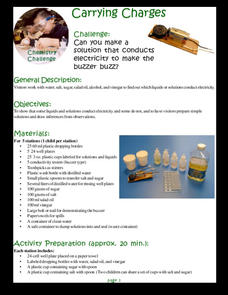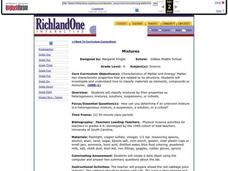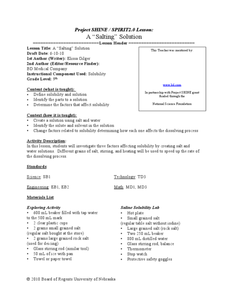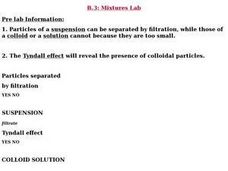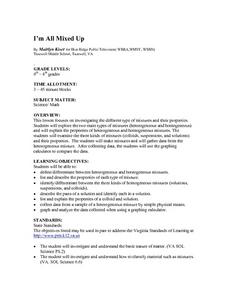Herff Jones Education
Acids, Bases, and Indicators—Colorful Chemistry
Lead the class in a colorful exploration of acids and bases as they learn to differentiate between the two. They identify common items considered acidic and basic, then explore their strengths and weaknesses. They titer solutions and...
Center for Learning in Action
Introducing Physical and Chemical Changes
Young scientists investigate chemical and physical changes to the states of matter—gas, liquid, and solid—as well as solutions and suspensions with a variety of demonstrations, grand conversation, and an interactive quiz to check for...
Sciencenter
Carrying Charges
What's all the buzz about electricity? Scholars take part in a scientific activity to test the conductivity of liquids and solutions. They first see if water, salad oil, alcohol, and vinegar cause a buzzer to buzz when electrodes are...
Curated OER
Solutions and Suspensions
Learners explore matter by conducting an in class demonstration. In this liquid mixture lesson, students identify the difference between a solution in which a solid dissolves into liquid, and a suspension where the solid doesn't dissolve...
Curated OER
Mixtures of Matter
Students experiment with solids and liquids. In this mixtures of matter lesson, students combine matter to form solutions. Students hypothesize, test, and analyze the data to draw conclusions. The lesson can be extended by having...
University of Georgia
What's So Special about Bottled Drinking Water?
Is artesian water designed to be better, or is it just from wells similar to those in the city of Artesium? This experiment looks at many different types of bottled waters, including artesian. Using a soap mixture, scholars test to see...
Curated OER
Mixtures
Sixth graders experiment with mixtures. For this chemistry lesson, 6th graders determine which mixtures are considered heterogeneous, a suspension, a solution or a colloid. Students create a data sheet of what they discover.
Curated OER
A “Salting” Solution
Ninth graders investigate the factors affecting solubility. In this chemistry lesson, 9th graders differentiate solvent and solute. They give examples of real world application of solutions.
Royal Society of Chemistry
Some Reactions of Carbon Dioxide—Microscale Chemistry
Precipitation reactions are always interesting. How about one that forms a precipitate using a gas? Chemists of any age will enjoy this twist on a standard solubility lab. Partners observe the lack of interaction between sodium hydroxide...
Curated OER
The Effects of Temperature on Chemical Mixtures
Students explore chemical cahnges and the effect of temperature on chemical mixturees, They make observations of the behavior and appearance of certain chemical mixtures and reactions.
Curated OER
Solubility and Intermolecular Forces
In this solubility and intermolecular force learning exercise, high schoolers are given 26 clues about forces between molecules such as hydrogen bonds and London forces and about solubility of solutions.
Curated OER
Solution Shapes
Eighth graders examine different solutions. In this solution material lesson students complete a lab activity and several worksheets.
Curated OER
Solutions, Suspensions, & Colloids Lab
In this solutions, suspension and colloid worksheet, students complete a lab experiment in order to determine if a given mixture is a solution, suspension or colloid. They are given six vials and they record their observations of each...
Curated OER
My Type of Mixture
In this mixture worksheet, students fill two test tubes with water and add starch to one and salt to the other. They stir the solutions and observe their appearance. They answer four questions about their mixtures and determine if they...
Curated OER
Mixture Mayhem
In this mixture worksheet, students are given five mixtures and they determine if each is a mechanical mixture or a solution. They also identify the way each substance within the mixture can be separated from the others.
Curated OER
Mixtures Lab
Students classify different mixtures. For this mixtures lesson plan, students determine samples to be suspensions, colloids, or solutions and compare homogeneous and heterogeneous mixtures.
Curated OER
Elements Compounds and Mixtures
In this science worksheet, students apply science basic knowledge of chemistry to the puzzles that are listed for the four parts of the sheet while focusing upon the identification of a metalloid.
Curated OER
The Determination of the Presence of Reducing Sugars Using Fehling's Solution
Students investigate different fruits and vegetables for the presence of sugars. In this sugars and Fehling's solution lesson, students test the juice from an onion and a lemon for the presence of sugar by adding Fehling's solution and...
Curated OER
I'm All Mixed Up
Middle school scientists compare and contrast heterogeneous and homogeneous mixtures. They differentiate solutions, colloids, and suspensions by examining samples of each. Note that the bulk of the lesson plan directs you how to...
Concord Consortium
Protein Folding
Long strings of amino acids fold themselves into stable peptides. The simulation allows scholars to observe the process in multiple ways. Using hydrophobic, hydrophilic, or a combination of proteins in three different solutions, the...
Beyond Benign
Urine Jeopardy
Urine can tell us a lot about what is happening in our bodies. In a hands-on activity, scholars administer pH, glucose, ketone, and protein tests to a sample of "urine" solution made from household ingredients. Their results lead them to...
Curated OER
Solutions, Suspensions, and Colloids
In this solutions, suspension, and colloids worksheet, students answer questions as it relates to their reading information about solutions, suspensions, and colloids. Students observe different examples and complete a chart as they...
Curated OER
Mixtures
In this mixtures activity, students fill in 7 blanks, determine if 4 statements are true or false, match 7 terms with the appropriate definitions, and solve 2 problems. These include topics such as homogeneous and heterogeneous mixtures,...
Curated OER
Separation of a Complex Mixture
Students develop a method to separate different types of mixtures. In this chemistry activity, students model the steps in the scientific method. They perform the experiment and analyze data.




